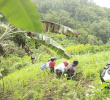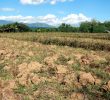Davao is considered low in rice sufficiency level, with palay production lessened at an average of 3.5 percent yearly from 2005 to 2010. In contrast, production of Cavendish bananas increased to over 2.8 million metric tons with a growth rate of 14.3 percent in the last four years.
By ALEX D. LOPEZ
Davao Today
NABUNTURAN, Compostela Valley, Philippines – Economic officials during the Regional Development Council (RDC) meeting last week at the provincial capitol here point to agri-industrialization as key to decreasing poverty and propelling the region forward.
National Economic Development Authority (Neda) Director Maria Lourdes Lim, Vice-Chairperson of RDC-X1 said agri-industrialization is needed “to realize the higher value of our agricultural products.”
Ironically, while NEDA is bullish in strengthening the banana industry, it was mum on the issue of low rice supply.
Davao is considered low in rice sufficiency level, with palay production lessened at an average of 3.5 percent yearly from 2005 to 2010. In contrast, production of Cavendish bananas increased to over 2.8 million metric tons with a growth rate of 14.3 percent in the last four years.
This was contained in the data from the Department of Agriculture incorporated in the 2011-2016 regional development plan presented in Thursday’s forum
Bananas are the foremost export products of the region with Mindanao supplying 95% of the total sales. “Transforming raw bananas into by products through processing would result to greater value in terms of income,” Director Lim added.
But the Neda Director did not elaborate when asked on the possible effects of land conversion on the issue of food security in the region.
Lim headed the pool of speakers together with Maj. Gen. Ariel Bernardo, commanding officer of the Philippine Army’s 10th Infantry Division and Mayor Reynaldo Navarro, president of the League of Municipalities in ComVal, which presented the plan to local officials, government line agencies, stakeholders and the media.
Davao City Mayor Sara Duterte, RDC-XI Chairperson, was not present during the occasion so were the governors in the regions who sit as members of the council.
According to the development plan, agri-industrialization shall be the main vehicle towards the reduction of poverty in the region that will be supported by strong industry and services sector. There must be “greater complementation between agriculture and industry sector,” supported by infrastructure and logistics, environmental sustainability, the plan indicated.
RDC leaders, likewise, pushed for greater participation of the private sector, amid criticisms this would reduce valuable state control over natural resources like mining.
Lawyer Ferdinand Tolentino, Deputy Executive Director of the Public Private Partnership (PPP) Center of Neda, said the Build-Operate-Transfer scheme and its variants that “were proven effective and efficient in terms of implementing infrastructure projects.”
NEDA’s Lim said schemes under the PPP can be used for the construction of a common service facility in mining particularly in disposing mine tailings. Lim added that a private sector has already expressed intention to come in and build the facility which the government cannot cope-up especially in terms of the investments required. She noted that this can be a good PPP project.
But she clarified that “the PPP is not an open invitation to multi-national corporations to come in Davao region and engage in business especially in the field of mining.”
On the other hand, the Bagong Alyansang Makabayan criticized PPP as an anti-people economic policy that “caters to foreign and capitalist interest.”
NEDA defined PPP as a contractual arrangement between government and private sector to deliver public infrastructure and public services. Its operations and schemes are guided by Republic Act 7718 or the Build-Operate-Transfer Law. (Alex D. Lopez/davaotoday.com)
Trade, World









